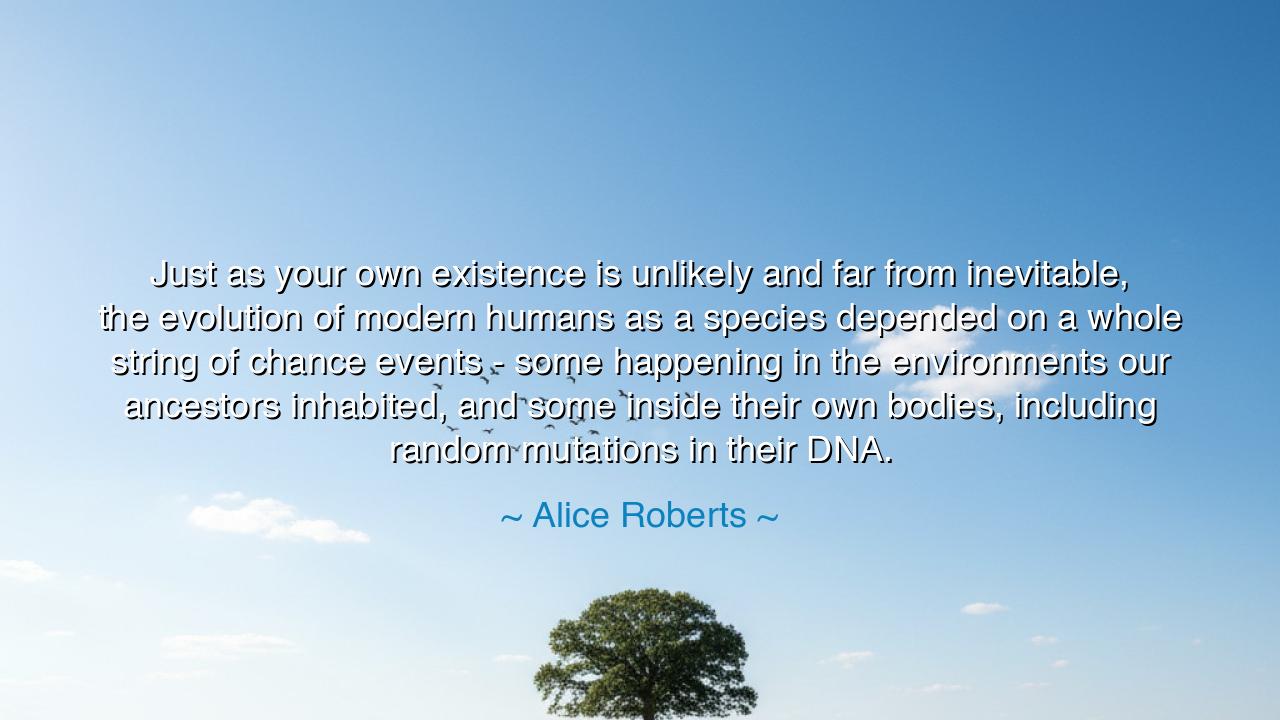
Just as your own existence is unlikely and far from inevitable
Just as your own existence is unlikely and far from inevitable, the evolution of modern humans as a species depended on a whole string of chance events - some happening in the environments our ancestors inhabited, and some inside their own bodies, including random mutations in their DNA.






In the words of Alice Roberts, "Just as your own existence is unlikely and far from inevitable, the evolution of modern humans as a species depended on a whole string of chance events—some happening in the environments our ancestors inhabited, and some inside their own bodies, including random mutations in their DNA," we are reminded of the fragility and unpredictability of life itself. Roberts speaks not only to the miracle of existence, but to the unseen forces—chance, circumstance, and mutation—that have shaped humanity. Her words challenge the notion that life is a predetermined journey, and instead invite us to consider how much of our existence is the result of randomness and fate, intertwined with choices and evolution.
In ancient times, the Greeks were fascinated by the idea of chance versus destiny. Philosophers like Heraclitus believed that life was governed by the Logos, a rational principle that shaped the universe, yet he also acknowledged the chaos of existence. According to Heraclitus, the world was in a constant state of flux, and while we may strive for meaning and order, chance always plays a role. Similarly, the ancient Romans, with their belief in Fortuna, the goddess of luck and fate, understood that the lives of individuals and the success of empires were often shaped by the unpredictable forces of chance. Roberts’ words resonate with these ancient teachings, as she reminds us that both our individual existence and the evolution of humanity have been deeply influenced by random occurrences—whether in the environment or within the very fabric of our beings.
Consider the story of Homer's Iliad, a tale of war and heroism, where the fate of the Greeks and Trojans hinges on unpredictable events. The death of Achilles' friend Patroclus, for instance, sets in motion a chain of events that ultimately leads to the fall of Troy. In this epic, chance events and unpredictable actions—Patroclus’ decision to fight in Achilles’ armor—lead to irreversible consequences. Similarly, the evolution of humanity as Roberts describes it, is shaped by the unpredictability of mutation and the environment. Just as a hero's fate in myth can turn on a single act of chance, so too did the path of human evolution depend on the randomness of genetic mutations and environmental shifts.
Roberts speaks of the random mutations in DNA that contributed to the evolution of modern humans. In ancient China, the philosopher Zhuangzi reflected on the natural world as a place of flux and spontaneity, where things were constantly changing in ways that could not always be predicted or controlled. Zhuangzi believed that humans were but one part of a vast, ever-changing universe, and that our actions, our existence, were often the result of forces beyond our control. Similarly, the mutations in our DNA—those tiny, random changes that over time lead to genetic diversity—are like the unpredictable changes of nature, shaping us in ways that cannot always be foretold. These mutations, much like the unpredictable weather or the changing tides, are part of the larger dance of life.
In examining human existence and the evolution of our species through the lens of chance and mutation, Roberts invites us to reflect on the impermanence and fragility of life. Socrates once said, “The unexamined life is not worth living,” urging us to look deeply at the nature of our existence. If our lives are indeed shaped by chance events, then we must ask ourselves: How do we respond to this uncertainty? How do we live knowing that so much of our existence is tied to randomness and the forces of nature? Perhaps, as Socrates would suggest, the answer lies in self-awareness—understanding that we are both the product of chance and of choice, and that our ability to reflect on our circumstances gives us the power to navigate this unpredictable world.
The lesson in Roberts' quote is that life is, in many ways, a dance with chance. Much of who we are, both as individuals and as a species, is the result of serendipity—those random moments of change that arise out of nowhere. Yet, in acknowledging this, we are also reminded that we have the ability to make choices that influence our future. Just as random mutations in DNA led to the evolution of new traits in our ancestors, so too can our choices today shape the world of tomorrow. Whether in our personal lives, our communities, or our societies, the decisions we make can have an impact, creating a ripple effect that shapes the future in ways we may not immediately see.
In our own lives, we must recognize the role of randomness and uncertainty in shaping our paths, but we must also take responsibility for the choices we make within that unpredictable landscape. While we may not control the genetic mutations that have made us who we are, we do have the power to shape our actions and our futures. Just as the ancients understood the importance of both virtue and chance in determining the course of life, so too must we find a balance between embracing life’s uncertainties and acting with purpose and intention. The future, like our evolutionary past, is uncertain—but it is also full of possibility for those who are willing to take the chance to shape it.






AAdministratorAdministrator
Welcome, honored guests. Please leave a comment, we will respond soon